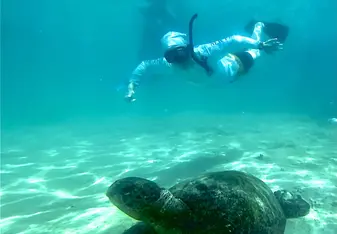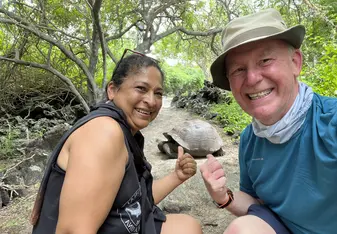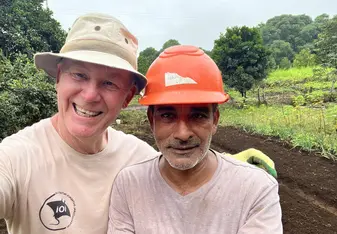Why did you choose this program?
I've always wanted to visit the Galapagos. It's remote, exotic and somewhere few people from my part of the world have visited. I wanted to spend my time learning new skills and gaining insights into a totally different way of life. It was important for me to be able to make a difference by giving something back to the local community.
What did your program provider (or university) assist you with, and what did you have to organize on your own?
As I'm a retired person, I organised the entire programme myself. I wanted to stay for a considerable amount of time in order to be able to be part of the local community. As a result I opted to participate in three different programmes: turtle nest monitoring; giant tortoise breeding centre; sustainable agriculture programme. In my spare time I volunteered to teach English in the community to people from all walks of life.
What is one piece of advice you'd give to someone going on your program?
Do your homework and prepare well. What do I mean by this? I spent considerable time writing my profile and ensuring that IOI understood in advance what I wanted to achieve. This allowed them to place me with the perfect host family and make the most of the intercultural experience. Being a mature volunteer, I wanted to ensure that I was committing a significant part of my day to helping the community. This was achieved not only by the programmes offered by IOI, but also by my own efforts to teach English in the community, building social media content for small businesses and generally get involved in local community initiatives which were outside the scope of the IOI programme.
What does an average day/week look like as a participant of this program?
It very much depends on the programme. The turtle nest monitoring programme was a relatively low commitment option with only one hour required twice a day, walking the beach and recording data. Work on the coffee plantation involved a six hour commitment per day, which was much more labour intensive but equally fulfilling. Being able to speak Spanish was invaluable, as I was able to communicate with local colleagues and learn so much more about the projects I was working on.
Going into your experience abroad, what was your biggest fear, and how did you overcome it? How did your views on the issue change?
Having travelled extensively during my life and my career my only fear was that I would not be placed with a family which would facilitate my intercultural experience or help me develop my Spanish further. The main fear was overcome by the excellent work of IOI matching me with my host family. The whole experience was simply outstanding and it surpassed my expectations.
Are IOI programmes suitable for the mature volunteer?
Generally yes! However, I do think that you need to do your homework and ensure that you express your expectations in your personal profile. There is always a danger that the volunteer experience could turn into voluntourism. For example, many programmes seem to focus on gap year students and potentially the balance of actual work and leisure activities might not suit everyone. If we take the turtle nesting programme, it was only a two hour commitment per day and that wasn't sufficient for me.
I supplemented the experience with other volunteer activities I created for myself to ensure that I felt fulfilled in terms of my personal commitment to the local community and requirement for learning. These activities fell outside the scope of what IOI offered. Make sure that the experience is going to deliver for you personally as one size definitely doesn't fit all. For me, it was a trip of a lifetime, achieved through the hard work of IOI, a certain amount of luck and some initiatives I took to ensure that I maximised the value of my stay.


